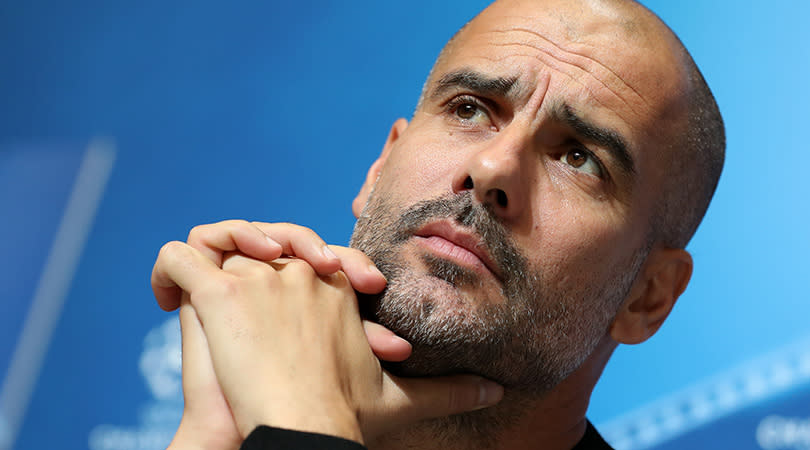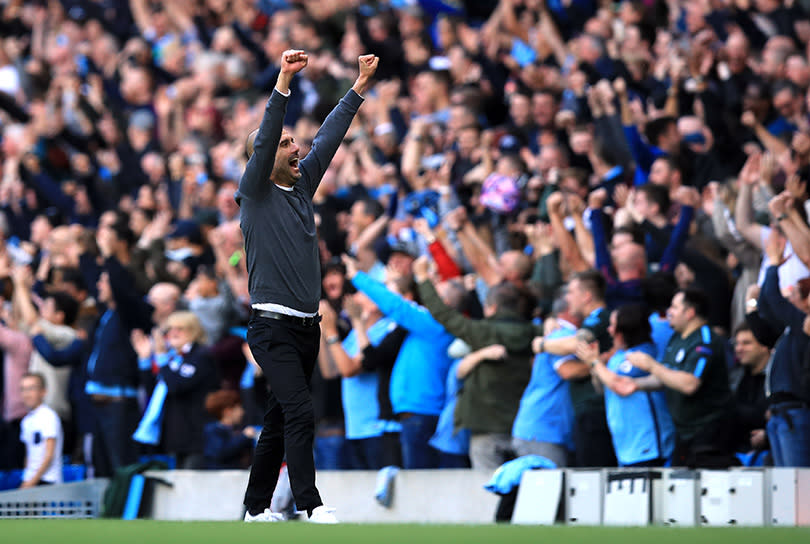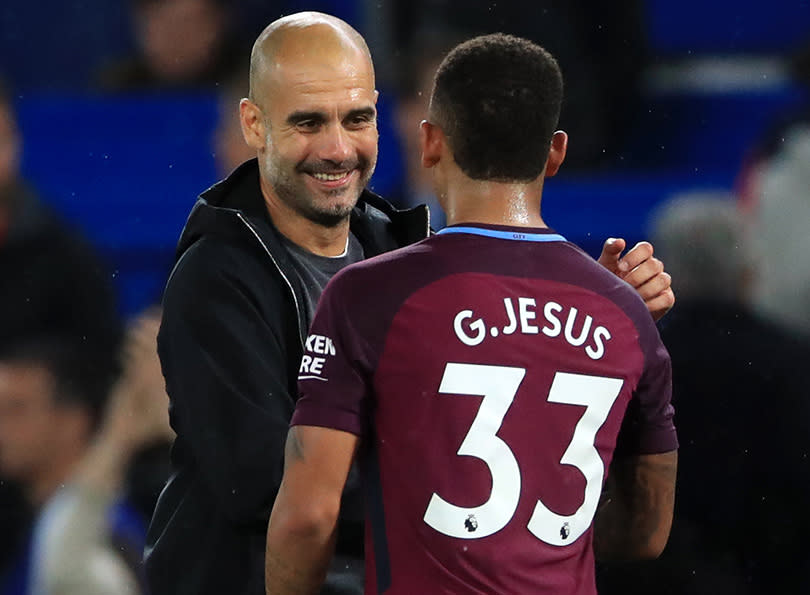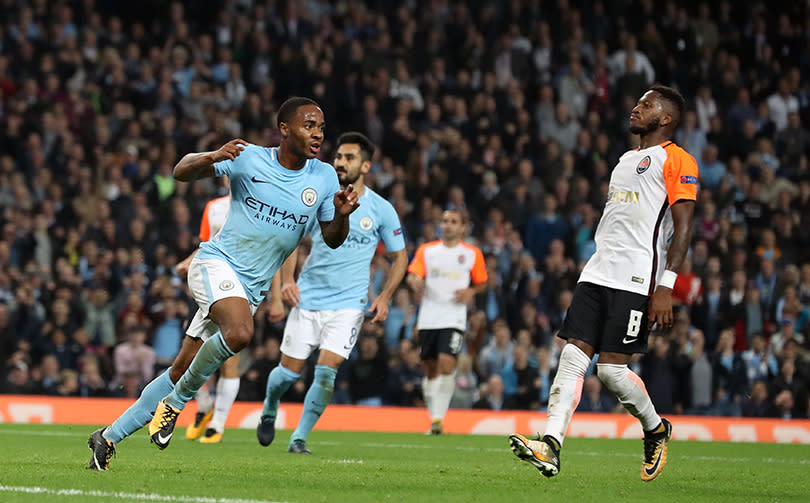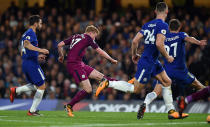Why big spending has almost nothing to do with Manchester City’s success this season
Big spending has had almost nothing to do with Manchester City’s form this season. The results are down to the genius of Pep Guardiola.
City forked out £220m on new players this summer, the most in the league. That would seem to justify those who see Guardiola as a ‘fraud’, elevated by dazzling squads at Barcelona and Bayern Munich. They will say his mediocrity got exposed at City last season. Now he needs to splurge £125m on full-backs in order to succeed.
And in a sense, Guardiola did first appear to be in a no-win situation. Deliver the title and he’d do the bare minimum as coach of the cheque-writing favourites. Lose and his reputation would unravel.
But look closer and you’ll see that the season opening has actually highlighted his gifts. Far from owing their brilliance to summer investment, City have been transformed by the visionary coaching that Guardiola’s supporters always claimed he possessed. He is, in short, living up to the hype.
The best in a century
Even if Guardiola had relied heavily on the transfer market this year, he would have deserved applause. Only he could have orchestrated the kind of football City are playing right now.
The results are astonishing enough: seven wins and a draw in eight games, victories at home to Liverpool and at Chelsea, and league form that reads 5-0, 6-0, 5-0, 1-0, 7-2. They have struck 29 goals, the first team at this stage to do so in the English top division since Everton in 1894/95.
Then you have their style and dominance. The 7-2 win at home to Stoke on Saturday treated fans to a dazzling display of concerted pressing, crisp passing and clinical finishing. “They look significantly better than anybody else we have faced in the league,” said Mark Hughes, whose Stoke have played Arsenal, Chelsea and Manchester United, beating the former and drawing against the latter.
This kind of football cannot be produced merely by making signings – in this case Benjamin Mendy, Kyle Walker, Danilo, Ederson and Bernardo Silva. What brings Guardiola’s gifts into further relief is how most of these newcomers have made only minor contributions so far.
Frail reinforcements
It would have been another matter had Guardiola replaced half his first-choice line-up at once, but most of the signings that were supposed to strengthen the side have either been injured or benched.
Mendy played just three full games before getting sidelined, Danilo has started just as many, while Bernardo Silva has only made Guardiola’s XI once in the league. Only two of the recruits have actually started regularly. One is Ederson, a clear upgrade on Claudio Bravo, yet hardly the chief reason for the intricate passing in midfield. Nor has he had much to do: in his eight league games, he has had to make 11 saves.
That leaves Walker, who has provided crucial width and pace to the attack, and chipped in with three league assists. Still, we aren’t talking about the driving force that links everything together.
So while these are fine players, bound to contribute more, identifying them as the key to City’s progress would be downright wrong. If the football is different, most of the players are not.
Familiar faces
Instead this is largely the same bunch that limped to third last season, 15 points behind Chelsea. They have just improved an awful lot.
The centre-back pairing that kept Chelsea at bay at Stamford Bridge were Nicolas Otamendi and John Stones, the same men who last season got bullied and played disastrous backpasses. David Silva has carved out six assists, one fewer than in the whole of last season. The left-back against Stoke and Chelsea was not an expensive acquisition from Monaco, or a Brazilian bought from Real Madrid – it was Fabian Delph.
The six outfield players who have featured in every league game this season were all at the club last season. So why are they now better? Because of Guardiola – and we know this because they keep telling us. “I feel like I’m developing as a player and a person under him,” says Stones. “He’s been massive for me,” says Sterling.
We also know it because it’s happened before.
Learning the language
Even at Barça and Bayern, amid the stellar names and vast resources, Guardiola improved his players. Barcelona won six trophies in his first 12 months, but their apex was the Champions League final 3-1 win over United in 2011, which led Sir Alex Ferguson to call them the best team he had faced. After the Champions League semi-finals in 2016, Atletico Madrid boss Diego Simeone said the same about Bayern.
Both of these games came in Guardiola’s third year, underlining his ability to make steady progress. The timeline also denotes the complexity of his methods – it takes years to learn. While Barça had the philosophical foundations in place, the Bayern squad were baffled by his style, even when accustomed to four years of possession-based play under Louis van Gaal and Jupp Heynckes. The Bayern staff said it was like teaching the players a ‘new language’.
Hence the difficulty for Guardiola at City, a club with no such foundations. The players had to learn, from scratch, an approach based on synchronised positioning and movement that puts enormous demands on technique and speed of thought. “You cannot imagine how hard it is to build something,” Guardiola said a year ago.
Now their possession average and passing accuracy have soared, while the defence is limiting opponents to 6.3 shots per game – the lowest rate in the top five European leagues. His work is bearing fruit. More of the new signings may come good with time, but until then nobody should be pointing to summer spending as the reason for City’s form.
They are largely the same as before, galvanised only by the understanding and mastering of Guardiola’s principles. It’s just taken a bit of time to get there.

 Yahoo Sport
Yahoo Sport 






































